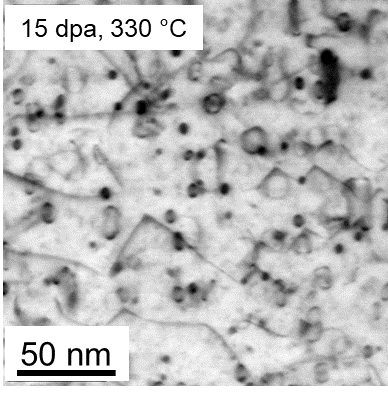Irradiation Influence
Fission neutron irradiations in material test reactors together with surrogate ion irradiation experiments are implemented for the simulation of irradiation effects and their dependence on the irradiation temperature and damage dose. The in-depth study of the radiation damage is carried out by means of high-resolution TEM coupled with modern analytics to understand the mechanisms for mechanical properties degradation and to support the development of advanced modeling tools for the prediction of irradiation effects. Furthermore, the degradation of mechanical properties is quantified in order to provide input for the assessment of the reliability of in-vessel components. Wide variety of microstructural characterization methods and mechanical testing are applied both in the Hot Cells of as well as in the cold labs.
Current research projects
- Neutron irradiation influence on the mechanical and fracture-mechanical properties of RAFM steels and tungsten alloys (E. Gaganidze, Q. Yuan)
- Quantitative TEM study of radiation defect microstructure in RAFM steels and tungsten alloys (Q. Yuan, E. Gaganidze)
- Modeling of irradiation induced defect formation and growth in RAFM steels and tungsten (S. Mohamed Kunju, E. Gaganidze)
- Development of Material Database and Properties Handbook (E. Gaganidze, S. Mohamed Kunju)
- Development and validation of Small Specimen Testing Technology (T. Metzler, R. Rajakrishnan, E. Gaganidze)
- TEM study of radiation defect microstructure in ion and neutron irradiated HEAs (L. Chauhan, Q. Yuan, E. Gaganidze)


